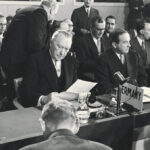
Retired Rear Admiral Paul Becker joins host Darrell Driver in the studio to discuss the role of intelligence in U.S. Homeland Security. Intelligence is discovering what an adversary seeks to conceal, a concept relevant to both warfare and homeland defense. Becker emphasizes the unique challenges of applying intelligence domestically, including legal and ethical considerations and the increasing convergence of foreign and domestic threats. The discussion highlights the critical importance of interagency coordination, information sharing, open-source intelligence, and public trust. Becker also touches on the threat from China, particularly the potential for cyber attacks targeting critical infrastructure.
Intelligence is finding out what the enemy doesn’t want you to know.
Podcast: Download
Paul Becker is a retired United States Navy rear admiral. He is the former Director for Intelligence, Joint Staff (J2) and was the principal intelligence advisor to the Chairman of the Joint Chiefs of Staff. He is the President and CEO at The Becker T3 Group.
Darrell Driver is Professor in the Department of Military, Strategy, Planning and Operations at the U.S. Army War College.
The views expressed in this presentation are those of the speakers and do not necessarily reflect those of the U.S. Army War College, U.S. Army, or Department of Defense.
Photo Credit: Image by DC Studio on Freepik





If an entity (such as the Soviet Union at the end of the Old Cold War or the United States at the end of the post-Cold War) moves out smartly to (a) abandon certain of its own central and unique ideas, values and beliefs and to (b) embrace certain of the ideas, values and beliefs of its most dangerous enemies,
Then, as a result of these such fateful decisions and associated moves, have not these such (capitulating/joining?) entities — obviously — (a) lost the ability to use their own unique values, attitudes and beliefs; these, to (b) do such things as intelligence gathering, to do such things as homeland security and defense, to do such things as unconventional and irregular warfare, and, thus, to do such things as national and/or collective security?
(Thus, for the Soviet Union after the Old Cold War, and for the United States after the post-Cold War, [a] the ability to use certain of one’s own [former?] unique values, attitudes and beliefs; these, to [b] do such things as intelligence gathering, to do such things as homeland security and defense, to do such things as unconventional and irregular warfare, and, thus, to do such things as national and/or collective security, these such tasks have now been left to others — such as, for the Soviet Union/Russia at the end of the Old Cold War, China and N. Korea — and such as , for the United States at the end of the post-Cold War, the European Union, Japan, S. Korea, Australia, etc.?)
If a/the primary goal of our opponents, such as Russia, China, Iran, N. Korea, the Islamists, etc., if this is — (a) via such things as cyber attacks targeting critical infrastructure, etc. — to (b) deter the U.S. and our allies for interfering as to their internal affairs and their external ambitions —
Then, as to these such primary and common goal of our opponents, are not these such entities (Russia, China, Iran, N. Korea, the Islamists, etc.) — by way of their such cyber attacks targeting critical infrastructure, etc. — (a) not concealing their capabilities from us, but, rather, (b) flaunting same?
This, making “intelligence” — designed to “find out what the enemy does not want you to know” — less relevant and useful in this instance?